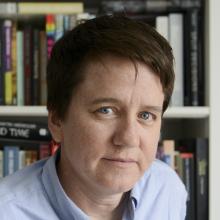Professor Heather Love Named 2023 Guggenheim Fellow
April 7, 2023
See this coverage as it originally appeared on the Penn Today website: https://penntoday.upenn.edu/news/four-penn-faculty-named-2023-guggenheim...
Four Penn faculty named 2023 Guggenheim Fellows
PIK Professor Ezekiel J. Emanuel, and Heather K. Love, Jennifer M. Morton, and Projit Bihari Mukharji of the School of Arts & Sciences have been awarded the Guggenheim Fellowship.
Based on “prior achievement and exceptional promise,” four University of Pennsylvania faculty have been awarded the prestigious 2023 Guggenheim Fellowship, according to the John Simon Guggenheim Memorial Foundation.
Penn’s 2023 Guggenheim Fellows are Penn Integrates Knowledge University Professor Ezekiel J. Emanuel, the Diane v.S. Levy and Robert M. Levy University Professor in the Perelman School of Medicine and Wharton School, and the School of Arts & Sciences’ Heather K. Love, professor of English; Jennifer M. Morton, Presidential Penn Compact Associate Professor of Philosophy; and Projit Bihari Mukharji, professor of history and sociology of science.
They were among 171 chosen in the United States and Canada from nearly 2,500 applicants for awards in 48 scholarly disciplines in this 98th annual competition for funding. Created and initially funded in 1925 by Simon and Olga Guggenheim in memory of their son, the foundation seeks “to further the development of scholars and artists by assisting them to engage in research in any field of knowledge and creation in any of the arts, under the freest possible conditions.”
Emanuel, one of two fellows in the category of medicine & health, is an oncologist and world leader in health policy and bioethics. He is a special advisor to the director general of the World Health Organization, a senior fellow at the Center for American Progress, and a member of the Council on Foreign Relations. He was the founding chair of the Department of Bioethics at the National Institutes of Health. As a special advisor on health policy to the director of the Office of Management and Budget and National Economic Council, he was instrumental in drafting the U.S. Affordable Care Act. Emanuel also served on the Biden-Harris Transition COVID Advisory Board. Emanuel has more than 350 publications and has authored or edited 15 books. His recent books include “Which Country Has the World’s Best Health Care” and “Prescription for the Future.” Emanuel, who has received numerous awards for his work, regularly contributes to The New York Times, The Washington Post, The Wall Street Journal, and The Atlantic and often appears on BBC, NPR, CNN, MSNBC, and other media outlets.
Love, one of three fellows in the category of literary criticism, is graduate chair of the English Department. Her research interests include gender and sexuality studies, 20th century literature and culture, affect studies, sociology and literature, disability studies, film and visual culture, and critical theory. She is the author of “Underdogs: Social Deviance and Queer Theory,” a genealogy of queer theory, and “Feeling Backward: Loss and the Politics of Queer History,” which weighs the costs of the contemporary move to the mainstream in lesbian and gay culture. She has written on topics including comparative social stigma, compulsory happiness, transgender fiction, spinster aesthetics, and reading methods in literary studies. She is currently at work on a project on the uses of the personal in academic criticism.
Morton, one of three fellows in the category of philosophy, researches the philosophy of action, moral philosophy, the philosophy of education, and political philosophy. She is interested in how “poverty and class shape our agency.” She is the author of “Moving Up Without Losing Your Way: The Ethical Costs of Upward Mobility,” which focuses on the ethical costs that first-generation and low-income students pay to take advantage of opportunities for socioeconomic mobility through education. During the 2023-24 academic year, she will be a fellow at the Center for Advanced Study in the Behavioral Sciences at Stanford University.
Mukharji, one of three fellows in the category of history of science, technology, & economics, is interested in issues of marginality and marginalization both within and through science, focusing on people who are disempowered. His twin ambition is “to write histories of science that are anti-colonial without being nationalist or identitarian.” He is the author of “Nationalizing the Body” about South Asian doctors and medical subordinates employed in the lower echelons of the colonial medical establishment in British India; “Doctoring Traditions,” about how Ayurvedic, ancient Indian medicine, modernized under colonialism; and "Brown Skins, White Coats," about race science in India from 1920-1966. His current project, “psychic socialism,” explores Cold War era scientific projects in India to tap into the psychic powers of individuals to build a new science.
Featuring Heather K. Love

 Department of English
Department of English
